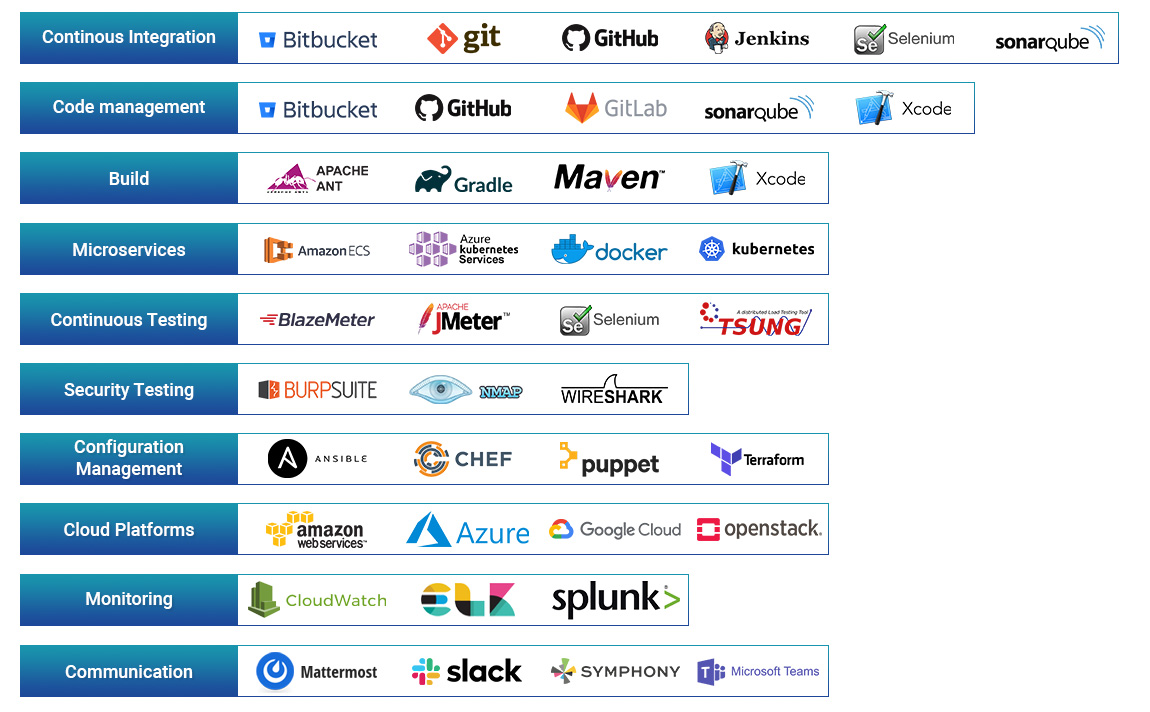DevOps Consulting Services
Accelerate Your Business Growth with Our Expertise
Implementing a DevOps strategy can deliver top performance by accelerating your software delivery cycles and skyrocketing business growth. Let our cloud experts help you set up the best DevOps strategy to ensure success in the cloud.
Transform your IT operations now with our FREE DevOps consultation services
Overview
Why Your Business Needs a DevOps Strategy
Implementing a DevOps strategy is crucial for any organization seeking to increase efficiency, enhance collaboration, and drive innovation. Some key benefits of embracing DevOps include:
- Improved collaboration between development and operations teams
- Faster release cycles and reduced time-to-market
- Higher software quality and reduced errors
- Increased scalability and flexibility of infrastructure
- Continuous integration, delivery, and deployment
- Enhanced security and compliance
- Cost savings through automation and optimization

Our Offerings
DevOps Services by Machines & Cloud

DevOps Implementation Services
DevOps release management is a vital service that focuses on streamlining and automating the software development lifecycle, ensuring a seamless transition from development to deployment. This approach bridges the gap between development and operations teams, fostering collaboration and reducing potential bottlenecks in the release process.
By implementing a continuous integration and delivery pipeline, DevOps release management enables rapid, iterative software releases while maintaining quality and stability. Organizations leveraging DevOps release management benefit from accelerated time-to-market, increased efficiency, and improved customer satisfaction, ultimately gaining a competitive edge in today’s fast-paced business landscape.

DevOps CI/CD Services
DevOps CI/CD enables organizations to deliver high-quality software with speed and efficiency. Continuous Integration (CI) focuses on automating the process of merging code changes from multiple developers into a shared repository, ensuring that the integrated codebase is tested and validated regularly. Continuous Delivery (CD), on the other hand, emphasizes automating the deployment of the integrated and tested codebase to various environments such as staging, testing, and production.
By employing DevOps CI/CD services, organizations can identify and address issues early in the development process, streamline workflows, and enhance collaboration among team members. Ultimately, this results in faster time-to-market, reduced risk, and increased customer satisfaction, providing businesses with a competitive advantage in the ever-evolving technology landscape.

DevOps Containerization Services
Containerization is a popular DevOps service that revolutionizes the way software applications are packaged, deployed, and managed. By encapsulating applications and their dependencies into lightweight, portable containers, this approach ensures consistent performance across various environments, be it local, staging, or production. Containerization simplifies the development process, streamlines the deployment pipeline, and enhances scalability, as containers can be effortlessly added or removed based on resource demands.
Containerization also supports microservices architecture, enabling teams to develop, test, and deploy individual components of an application independently, resulting in improved agility and reduced time-to-market. By adopting containerization, organizations benefit from increased efficiency, better resource utilization, and a more resilient application infrastructure, ultimately maintaining a competitive edge in today’s fast-paced software development landscape.

DevOps Infrastructure Automation
Infrastructure Automation is a key DevOps service that focuses on streamlining and managing the provisioning, configuration, and maintenance of an organization’s IT infrastructure. By employing automated tools and scripts, Infrastructure Automation eliminates the need for manual intervention in tasks such as server provisioning, network configuration, and security updates.
This approach not only reduces the likelihood of human error but also accelerates deployment processes and ensures consistency across various environments. As a result, teams can rapidly adapt to changing business requirements and scale their infrastructure to meet demand. By embracing Infrastructure Automation, organizations can significantly improve operational efficiency, optimize resource utilization, and maintain a robust, agile IT infrastructure that supports their strategic goals and fosters innovation in an increasingly competitive market.

DevOps Release Management and Orchestration
Release Management and Orchestration combines the power of streamlined release processes with the efficiency of automation to facilitate seamless software delivery. Release Management focuses on planning, scheduling, and coordinating the deployment of software releases across various environments, ensuring smooth transitions between development, testing, and production stages. Orchestration, on the other hand, automates complex, multi-stage processes, enhancing the efficiency of tasks and workflows throughout the development lifecycle.
By integrating Release Management and Orchestration, organizations can optimize their software delivery pipeline, minimize errors, and improve collaboration among team members. This holistic approach results in accelerated time-to-market, higher software quality, and increased adaptability to evolving market demands, ultimately providing businesses with a competitive advantage in the dynamic world of software development.
![]()
DevOps Automation Services
DevOps automation is aimed at streamlining workflows, reducing manual intervention, and increasing efficiency across the entire development lifecycle. By automating repetitive tasks, such as code integration, testing, deployment, and infrastructure provisioning, DevOps Automation minimizes human error, accelerates delivery, and enhances overall software quality. This approach fosters a culture of collaboration and continuous improvement, as teams can focus on innovation and addressing critical challenges rather than tedious, time-consuming tasks.
In turn, organizations employing DevOps Automation enjoy reduced costs, optimized resource utilization, and improved agility, enabling them to respond effectively to rapidly changing market demands and maintain a competitive edge in their respective industries.
Why Us?
As a leading DevOps consulting firm in the USA, we excel at delivering exceptional services and solutions.
Our DevOps experts work closely with your organization to design and implement tailored solutions that drive growth and innovation. Our tailored approach includes:
- Assessment: We begin by evaluating your existing infrastructure, processes, and organizational culture to identify areas for improvement and opportunities for growth.
- Strategy Development: Based on the assessment, we create a customized DevOps roadmap to guide your organization towards seamless integration and continuous improvement.
- Implementation: Our team of DevOps engineers and architects collaborate with your in-house teams to implement the right tools, processes, and practices, ensuring a smooth transition to a DevOps environment.
- Training and Support: We provide training and ongoing support to empower your teams to fully leverage DevOps capabilities and ensure long-term success.

Tools
DevOps Tools our Experts are Well-versed in
We have extensive experience with a wide range of DevOps tools and technologies, enabling us to tailor our solutions to your specific needs. Some of the tools we use at every stage include:

Success Story
Huge Cost Savings using Microservices with Kubernetes for a Retail and Hospitality Company
Our client, a prominent Retail and Hospitality company, faced significant challenges related to their monolithic application architecture, which hindered their ability to scale and adapt to fluctuating market demands.
The existing infrastructure was plagued by high maintenance and operational costs, slow deployment cycles, and limited flexibility in responding to the dynamic nature of the retail and hospitality sectors. Additionally, the monolithic architecture made it difficult to implement new features and improvements, stifling innovation and growth.
Here’s what we did:
Our team of DevOps experts collaborated with the client to address these challenges by transitioning to a microservices architecture, leveraging Kubernetes for container orchestration.
We began by conducting a thorough assessment of their existing application and infrastructure, identifying areas ripe for modernization and optimization. After creating a tailored roadmap for the transition, we worked closely with the client’s development and operations teams to implement microservices-based solutions.
With microservices, the application was broken down into smaller, independently deployable components, each responsible for a specific business function. This modular approach not only streamlined the development and deployment processes but also allowed for better resource allocation and load balancing.
Kubernetes, as the container orchestration platform, ensured seamless management, scaling, and monitoring of the microservices, automating critical tasks and minimizing manual intervention.
Results:
By adopting a microservices architecture and Kubernetes orchestration, the Retail and Hospitality company experienced:
- Significant reduction in operational and maintenance costs
- Improved application scalability and performance
- Accelerated deployment cycles and faster time-to-market
- Enhanced flexibility in responding to market demands
- Increased innovation and growth opportunities
With our expert guidance, the client successfully transformed their application infrastructure, achieving substantial cost savings and unlocking new potential for innovation and growth in the competitive Retail and Hospitality industry.

